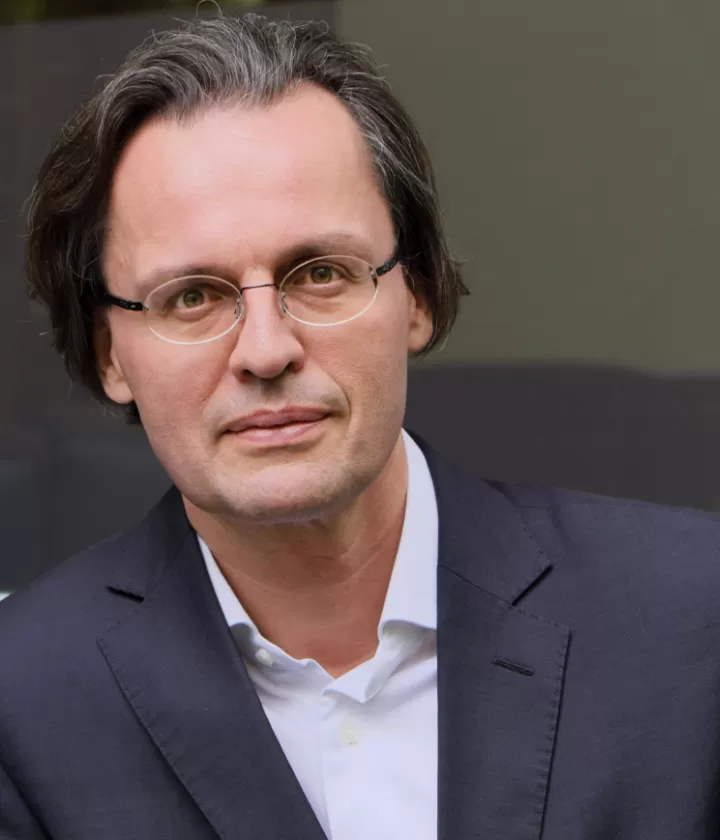
Bernhard Pörksen: Between outrage and insight
07:00 pm
Studio 14 – die rbb Dachlounge, Masurenallee 20, 14057 Berlin
How can we have an open, respectful dialog in times of polarization and disinformation? What do we need to usher in a new culture of constructive debate? On September 25, 2025, media studies professor Bernhard Pörksen will be the guest in our Please irritate me! discussion. In conversation with Peter-André Alt, he will be talking about the power of language, media responsibility, and how we can make space for genuine discourse.
Bernhard Pörksen is one of the best-known media studies professors and intellectuals in the German-speaking world. He lectures at the University of Tübingen and is known as an author, speaker, and interviewee for his incisive analysis and passionate pleas for a culture of open, constructive debate. He explains how outrage became a currency, how social media accelerates and polarizes debates – and how this shifts the conditions for science communication. In a “scandal-driven society”, Pörksen believes that people often confuse attention with relevance – with far-reaching consequences for science and research. For Pörksen, listening, particularly at a time when public discourse is dominated by polarization and noise, is a form of attention that helps us understand otherness, handle complexity, and rethink communication.
In the Please irritate me! discussion series, Pörksen will be talking to Peter-André Alt about the role of the media in an uneasy world, about the responsibility of science and journalism, and about the importance of true listening.
The event is free to attend and is aimed at anyone who enjoys lively debates and fresh perspectives .
In collaboration with the SILBERSALZ Science & Media Festival and Die Junge Akademie
Further information about the venue and the discussion series can be found here.

About the speaker
Bernhard Pörksen is Professor of Media Studies at the University of Tübingen and is one of the most distinguished voices in the German-speaking world on questions of communication, media ethics, and the culture of public debate. In his new book, Zuhören. Die Kunst, sich der Welt zu öffnen (“Listening. The art of opening oneself up to the world”, 2025), he focuses on a skill that often gets lost in noisy disagreements: the ability to listen attentively and with an open mind. Pörksen shows how listening, as part of an active dialog, can deepen our understanding for others, overcome polarization, and open up new perspectives. With his clear focus on the dynamics of public communication and his ability to irritate people – in a good way – he believes it is always possible for people to come to an understanding.
Notice to audience regarding film and photographic recordings
Please note that our events are digitally recorded and/or photographed. By attending, you acknowledge and agree to grant Wübben Stiftung Wissenschaft and its partners the right to digitally record, film, photograph, or capture your likeness during the event and to distribute, broadcast, use, or otherwise disseminate such media in perpetuity without any further approval from you.
Please irritate me! discussion seriesseries
Irritation works – it challenges us, makes us think, and helps us see familiar things in new ways. The Please irritate me! discussion series leverages this potential. Together with guests from science and society, we provide a platform for surprising ideas, neglected questions, and unusual approaches to research. We are interested in topics that question familiar thought patterns. In new perspectives that get us thinking. And in scientists who, with curiosity and courage, explore the boundaries of human knowledge – frontiers where new insights are often sparked by a feeling of irritation. We look forward to seeing you at one of our events!
Image
An impression of the COVID-19 protest in Berlin in November 2020, which was organized by the Querdenken (“lateral thinking”) movement. Despite a ban on demonstrations, several thousand protesters took part, most of them without face masks over their mouths and noses, and in defiance of social distancing rules.
Credits: picture alliance / SULUPRESS.DE | Vladimir Menck/SULUPRESS.DE